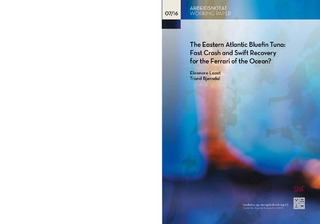The Eastern Atlantic bluefin tuna : fast crash and swift recovery for the Ferrari of the ocean?
Working paper
Permanent lenke
http://hdl.handle.net/11250/2431346Utgivelsesdato
2016-11Metadata
Vis full innførselSamlinger
- Working papers (SNF) [809]
Sammendrag
The Eastern Atlantic and Mediterranean Bluefin tuna tastes delicious.
Naturally, the Japanese sashimi market fights over this high value fish.
Unfortunately, this moneymaking resource has been overfished since the
1970s due to its’ wide geographical spread and high sea open access
characteristic, which means over 25 countries sought to capture it. This
cumulated in near extinction of the species in the mid-2000s. The organisation
in charge of managing the stock, the International Convention for the
Conservation of Atlantic Tuna (ICCAT), established a fifteen-year species
recovery plan starting in 2006-2007. The plan includes fishing seasons, gear
restrictions, quantity control and strict monitoring of vessels. Ten years into
the programme, this project sets out to assess the state of the stock.
Quantitative indicators will enable assessing the health of the stock, and
qualitative methods will evaluate the managerial success of the recovery
programme, in terms of member compliance and caution adopted with
regard to the stock. Results of the research show the stock is en-route to
recovery. Population indicators are recovering faster than expected.
Recommendations, such as educational courses on stock sustainability for
fishermen or knowledge-access incentives to comply, will hopefully reach the
ICCAT to adapt the programme for the remaining five years.
